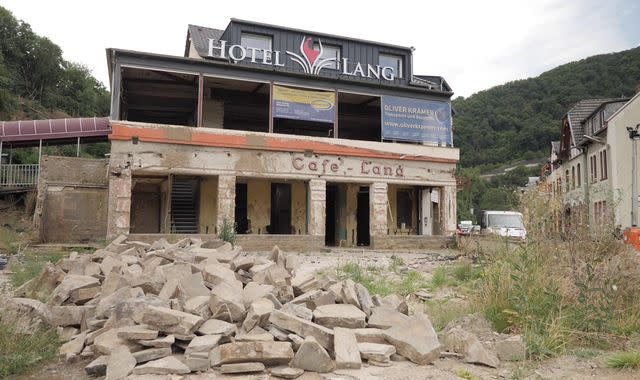A long legacy: How the scars from Germany's worst ever floods still run deep, a year on

A year after one of the worst floods in Germany's history, and the scars of the disaster are still visible.
In some streets in Altenburg, no building was left untouched.
Facades hang off houses.
Red crosses on walls and doors mark the condemned - the damage too extensive to repair.
In other areas of the Ahr valley, businesses remain closed or bordered up.
More than 180 people in West Germany died when water swept through communities.
In some places, the rain was so heavy it washed away the land, as extreme weather brought a European superpower to its knees.
A year on, Martin Eggerts's home in Sinzig is still drying out.
The floods reached the first-floor balcony.
He says there was no warning for the scale of what was coming.
He could only watch as water inundated the care home opposite killing 12 people.
More:
Before and after images show full extent of devastation
"The water kept on going up and then we heard one of people living in the building crying, 'Help, help me.' He was holding on the tree or onto the window. He was the only one who survived this in the basement.
"We had to call to him, 'Hold on. Hold on. You will be safe soon'."
Germany is the largest economy in the EU, yet a year on, some communities are a still shell of what they were.
The government has pledged 30 billion euros to the rebuild but many complain the money is slow to come through.
People are worried they will be forgotten and question if they'll be better protected in the future.
On the edge of Bad Neuenahr-Ahrweiler, temporary container homes house the victims.
'I'm terrified of water'
Anja and Rainer Schumacher show me around their compact one-bed place.
Anja is still deeply traumatised.
"I don't sleep well. I'm incredibly terrified of water. This is not about taking a shower, but if it's raining outside, I panic, then I have to stop and pull my car over," she says.
Their home is still too damaged and unsafe to live in.
"Everything is broken, everything is destroyed. The town is destroyed, our home is destroyed. It's all destroyed," she says, beginning to cry.
In the Ahr valley, the local wine industry took a huge hit. Millions of euros of damage was done overnight.
Peter Kriechel lost 40,000 litres of wine and 20,000 bottles worth.
'It was a tsunami'
He's now selling flood-soaked bottles to raise money to help the industry rebuild.
"I think climate change is a very big problem so we must protect ourselves. It was not high water, it was a tsunami. It was a big wave which destroyed everything in this valley," he says.
And as the rebuilding continues, experts warn more extreme weather is to be expected in the future.
"Germany is not prepared right now," says Professor Dr Claudia Kemfert, head of the Department of Energy, Transportation and the Environment at the German Institute for Economic Research.
"The likelihood is increasing that such kind of events could happen more often and even more intense because we are just at the beginning of climate change."
Criticised for being unprepared and under equipped, Germany's government has a new disaster resilience plan.
But climate change pushed this country to its limit and the next test could be even more brutal.


